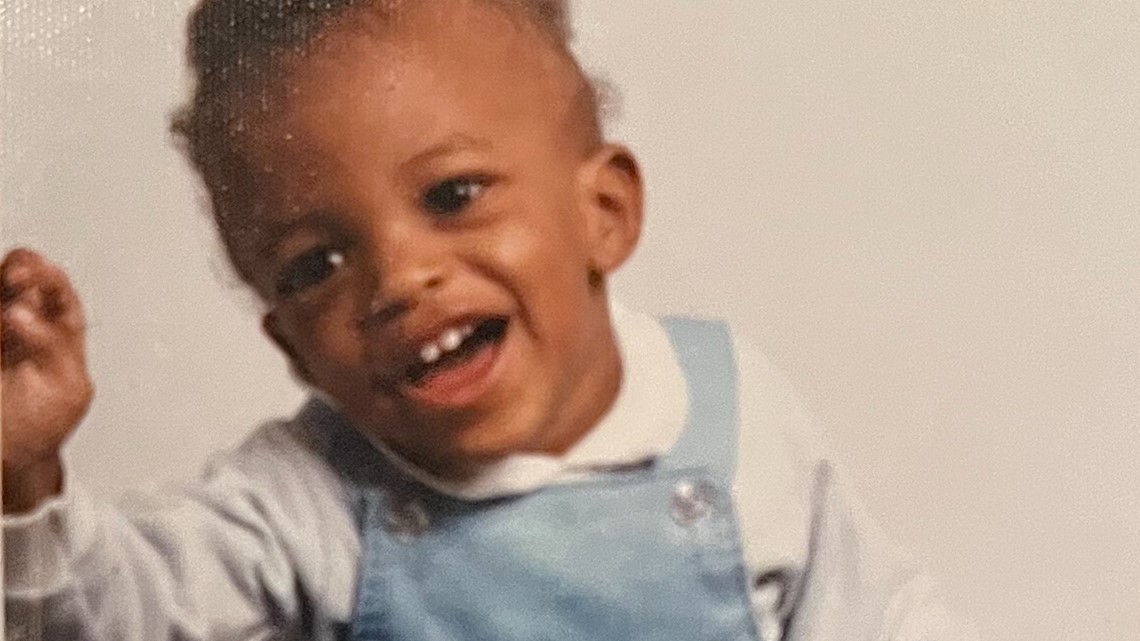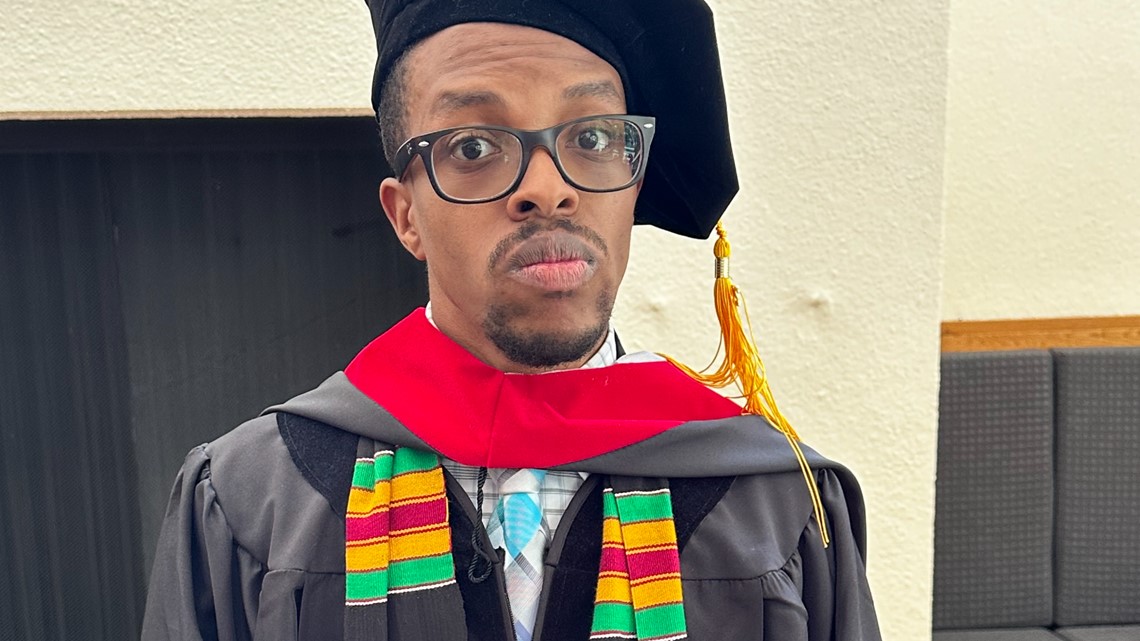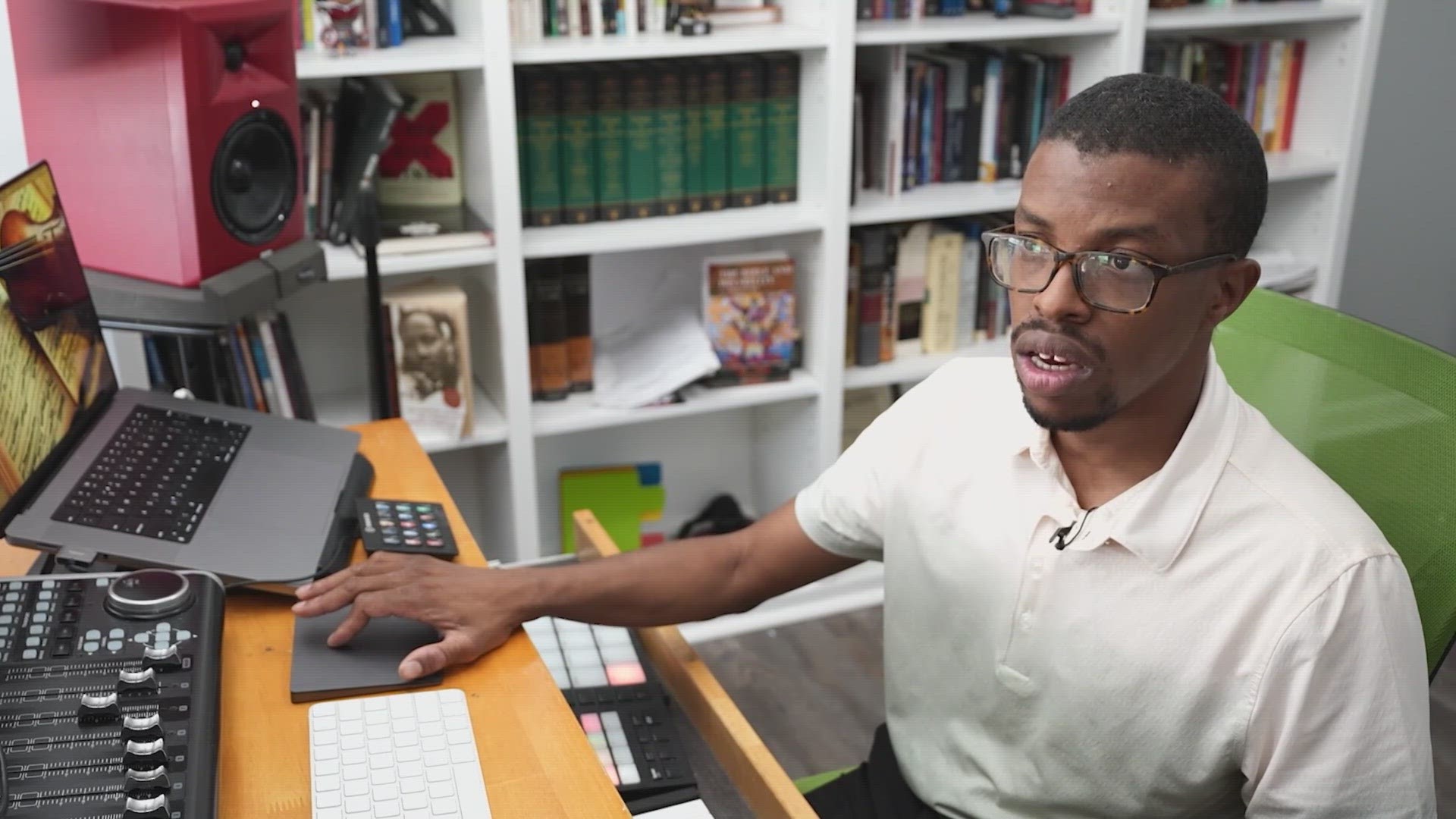INDIANAPOLIS — In The Toby Theater at Newfields, all eyes are on a man who’s lived much of his life being overlooked.
“I’ve been discounted. I’ve been underrated, underestimated and when you get in that place, it’s hard to find your way,” said 38-year-old Milton Keys.
Since birth, Milton has been on a path marked by people doubting him every step of the way.
“When I was born, I was given two hours to live, then two days, then two months, then two years,” Milton said.
But now, the kid who was never cast as the lead character in any scene is stealing every single one in a documentary about a life with cerebral palsy.
“They said I would never have cognitive abilities. I would never walk, talk or understand,” said Milton of doctors’ predictions when he was younger.


Instead, Milton not only lived past the age of 2, but he also discovered cerebral palsy wasn’t all with which he was born. At a young age, Milton started hearing sounds in his head – sounds that wouldn't go away.
So, he took them and translated them using musical instruments.
“I learned to play bass. I learned to play cello,” Milton recalled, adding that he composed his first musical piece when he was only 15 years old.
Today, in a studio in an upstairs room of his house with degrees and awards hanging on every wall, Milton now uses a computer to take the music inside of him and bring the sounds to life.
His latest composition is called “Masterpiece,” the title track of the documentary with the same name.
“The song is about one who they’ve looked down on, but the world is missing out on a work of art, and that’s not just me. That’s all of us. We’re created in the image of God,” Milton said.
That’s a message Milton, who’s also an ordained minister, has preached at churches. He said that sometimes, a person's first instincts have been to pray for his healing.
“What are we saying to people with a disability if the first thing we say to them is, ‘We’re going to get you healed,’” Milton said. “What we’re saying is, ‘Before you can be a part of our congregation, we’re going to make you like us.’”
Milton said he isn't trying to be like anyone but himself.


This month, he earned his Doctorate of Ministry after developing a curriculum for churches on how to better serve their parishioners with physical challenges.
He created a curriculum for parents with disabled children, too, to help them better understand their children’s rights.
“I don’t want to just empower people with disabilities, I want to build and create allies,” Milton said.
He’s certainly built a network of his own such allies, with people like Marc Bessiake, the filmmaker who brought Milton’s story to the big screen.
“This is an artist’s story. This is an artist’s story who just happens to have cerebral palsy and anyone who has any sort of disability has value,” said Bessiake.
Milton’s story, though, includes fighting to convince potential employers of such value.
Even with several degrees and a teaching certificate, Milton said for years, he couldn’t get a job as a teacher. That's even though he was working as a substitute and teaching assistant in the same districts unwilling to hire him as a full-time teacher.
“I’ve got someone telling me I can’t do what I get paid to do already. That’s cognitive dissonance,” said Milton. “I had an interview, knocked it out of the park, I got a call, ‘Oh they decided the kindergarteners won’t accept you.' The kindergarteners never met me."
The ones at St. Monica’s Catholic School haven’t had any trouble with that.
Three years ago, Milton left substituting behind and took a job with Indy Urban Youth Music Academy. He now goes into classrooms and teaches local musicians how to teach kids music.
“Kids are much more open than adults. Kids love me. People are people to kids,” said Milton.
And to the kids Milton gets to work with now, he doesn’t have to prove anything. He just is and that is enough.
“Because a teacher is a teacher to them,” Milton said. “The world wants to make me an anomaly.”
Milton, though, isn't here to be anyone’s example of what it means to overcome.
“If I’m the special guy who overcame. People don’t think he’s worth much, but he proved them wrong. But people still don’t think we’re worth much, Emily. That’s the problem,” said Milton. “The problem is not that I don’t prove it ... the problem is that no one believes it in the first place.”
Maybe no one except the kids and musicians Milton works with every day. Maybe no one except the people who came to see the documentary, “Masterpiece,” in which Milton conducts a choir singing the title track he composed for the film.
“I’m here for the left out and the left behind ... because when you leave me out, you lose out on something," Milton said. "I don’t want the world to miss out."
Yes, Milton Keys may have been overlooked for most of his life, but in this moment in time – people aren’t looking away, and they don’t want to.
And even if they did, Milton Keys wouldn’t let them.

